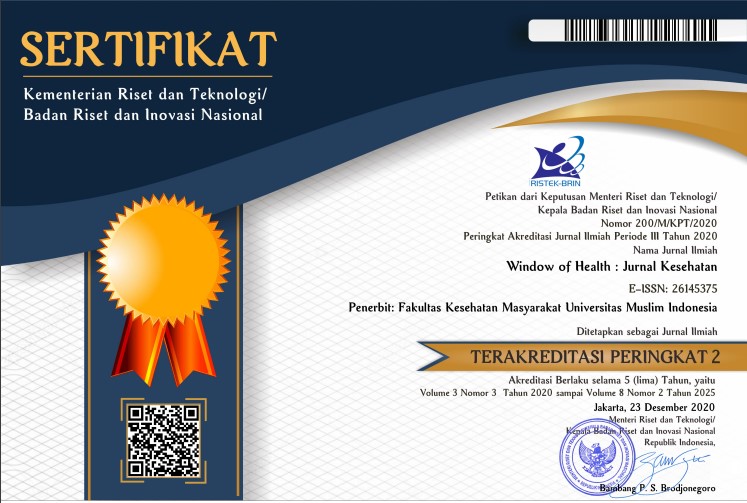Husband Participation in Pregnant Women's Classes on Decision Making in P4K (Delivery Planning and Complication Prevention Program)
Abstract
The maternal mortality rate reaches 305 per 100.000 live births, where 76% of maternal deaths occur in the labor and postpartum phases. The high mortality of maternity mothers is caused by delays in family decisions in handling complications. Delays in getting help are caused by the patient's condition, which is already very severe until the place of referral due to the postponement of the family in making a decision to be referred immediately. The Childbirth Planning and Complication Prevention (P4K) program in the pregnant women's class is an activity facilitated by midwives in the village to increase the active role of husbands, families, and communities in planning safe childbirth and preparing for complications for pregnant women. The study aims to determine the effect of the husband's participation in the pregnant women's class on P4K clinical decision-making. This type of research is observational analytics. The study was carried out in the Working Area of the Soropia Health Center. The total sample was 46 husbands who had pregnant wives, consisting of 23 husbands who participated in the pregnant women's class and 23 husbands who did not participate in the pregnant women's class. The data were analyzed using a chi-square test with the SPSS application. This study shows that, on average, husbands who participate in the course of pregnant women making decisions are in the excellent category. The decision-making in question is preparing for childbirth and preventing complications. The chi-square test results show a value of p=0.000 <α. The husband's participation in the pregnant women's class influences P4K decision-making. Based on this, health workers need to socialize continuously with their husbands about the importance of attending classes for pregnant women so that they can provide knowledge about childbirth preparation and the prevention of complications.
References
2. Susiana S. Angka Kematian Ibu: Faktor Penyebab dan Upaya Penanganannya. Bidang Kesejahteraan Sosial Info Singkat. 2019;11(24):13–8.
3. Biro Komunikasi dan Pelayanan Masyarakat. Kemenkes Perkuat Upaya Penyelamatan Ibu dan Bayi – Sehat Negeriku [Internet]. Biro Komunikasi dan Pelayanan Masyarakat, Kementerian Kesehatan RI. 2021 [cited 2022 Jan 23]. Available from: https://sehatnegeriku.kemkes.go.id/baca/umum/20210914/3738491/kemenkes-perkuat-upaya-penyelamatan-ibu-dan-bayi/
4. Alfianur A, Susanti S, Padilah R, Purnamasari A. Gambaran Pengambilan Keputusan Klinis Dalam P4K (Program Perencanaan Persalinan Dan Pencegahan Komplikasi) Di Daerah Pesisir Pantai Amal Lama Tarakan. Journal of Borneo Holistic Health. 2018;1(2):160–9.
5. Kamidah, Yuliaswati E. Program Perencanaan Persalinan dan Pencegahan Komplikasi (P4K) Sebagai Upaya Menurunkan Angka Kematian Ibu. Gaster: Jurnal Kesehatan [Internet]. 2018 [cited 2022 Jan 24]; XVI(1). Available from: http://jurnal.aiska-university.ac.id/index.php/gaster/article/view/245
6. Kementerian Kesehatan Republik Indonesia. Pegangan Fasilitator Kelas Ibu Hamil. Jakarta: Kementerian Kesehatan; 2014.
7. Ilyas U, Sonda M, Hidayati H. Dukungan Suami, Pengetahuan Ibu Hamil Trimester III dengan Pelaksanaan Program Perencanaan Persalinan dan Pencegahan Komplikasi (P4K) di Puskesmas Kassi-Kassi Kota Makassar. Media Kesehatan Politeknik Kesehatan Makassar. 2020 Dec 26;15(2):158.
8. Pramasanthi R. Hubungan pengetahuan ibu hamil dan dukungan suami dengan kepatuhan melaksanakan Program Perencanaan Persalinan dan Pencegahan Komplikasi (P4K) di. 2016 [cited 2022 Jan 24]; Available from: https://digilib.uns.ac.id/dokumen/detail/52311
9. Paulos K, Awoke N, Mekonnen B, Arba A. Male involvement in birth preparedness and complication readiness for emergency referral at Sodo town of Wolaita zone, South Ethiopia: A cross sectional study. BMC Pregnancy and Childbirth [Internet]. 2020 Jan 30 [cited 2022 Jan 24];20(1):1–7. Available from: https://link.springer.com/articles/10.1186/s12884-020-2758-9
10. Kementerian Kesehatan. Laporan Riskesdas 2018 Nasional [Internet]. Jakarta: Lembaga Penerbit Badan Penelitian dan Pengembangan Kesehatan (LPB); 2019 [cited 2022 Jan 24]. Available from: http://repository.litbang.kemkes.go.id/3514/
11. Budiart V, Putri R, Rizky Amelia C. Hubungan Karakteristik Ibu dan Dukungan Suami dengan Tingkat Pengetahuan Ibu Hamil Tentang Tanda Bahaya Kehamilan. Journal of Issues in Midwifery. 2018 Jun 8;2(1):1–18.
12. Suarayasa K. Strategi Menurunkan Angka Kematian Ibu (AKI) Di Indonesia - Ketut Suarayasa - Google Buku [Internet]. Yogyakarta: Deepublish; 2020 [cited 2022 Jan 24]. Available from: https://books.google.co.id/books?hl=id&lr=&id=5IzrDwAAQBAJ&oi=fnd&pg=PP1&dq=Strategi+menurunkan++Angka+Kematian+Ibu+(AKI)+di+Indonesia&ots=esTrMNc6qE&sig=-nkzz5Qu2TO2N5IJiayC1KWcTWk&redir_esc=y#v=onepage&q=Strategi%20menurunkan%20%20Angka%20Kematian%20Ibu%20(AKI)%20di%20Indonesia&f=false








